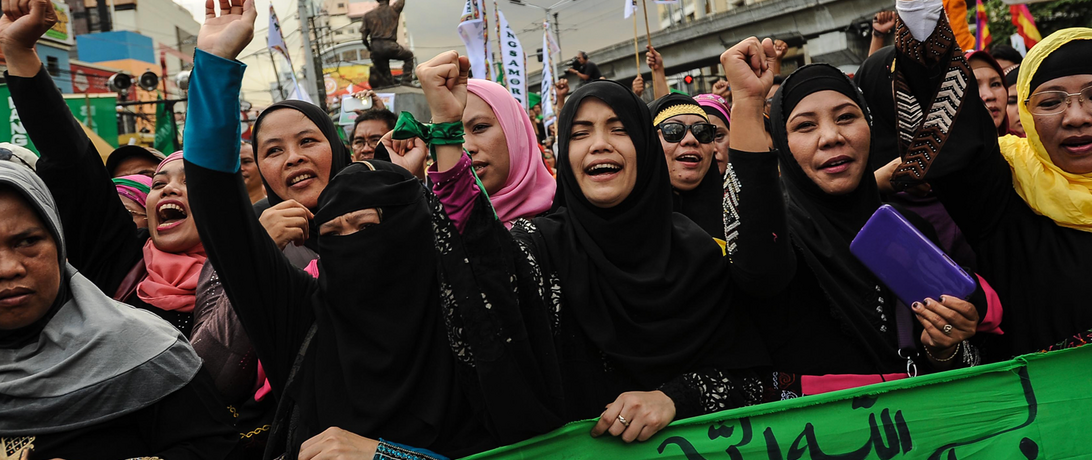
Whether it’s running businesses or participating directly in support of war efforts, in conflict-affected environments the disruption to social and normative systems caused by the conflicts means that opportunities for women and girls can expand.
Gender norms inform what work is seen as appropriate for women and girls. This affects employment opportunities in nearly all contexts and often constrains what work women and girls are able to do. Yet, in conflict-affected environments the disruption to social and normative systems caused by the conflicts means that opportunities for women and girls can expand—whether it’s running businesses or participating directly in support of war efforts. On the one hand, the disruption caused by the conflict can lead to opening, if limited, opportunities for women and girls. On the other hand, the ongoing fragility and poor economic development often endemic in fragile and conflict-affected states can make gains for women’s equality difficult to realize for the majority of the population, particularly in employment.
Research we conducted in the Philippines emphasized both the ways in which gender norms shift to expand and close opportunities for women and how ongoing fragility affects the types of employment available to women and girls. This work focused on the Southern Philippines, which lags behind the rest of the Philippines on nearly every development indicator, including women’s rights and equality, and still shows elements of conflict.[1] Formally, the peace agreement between the Philippines federal government and the Moro Islamic Liberation Front (MILF) ended hostilities in Mindanao. However, a number of armed groups continue to operate, and political violence continues sporadically.
The peace process in Mindanao created some opportunities for the formal advancement of women’s rights in the region. It recognized the role that many women and girls played in creating and supporting peace in Mindanao. In interviews we conducted in Mindanao in September 2015, we talked about how women and girls negotiated temporary cease-fires at the community level and created systems to help communities displaced by conflict or natural disasters during the conflict between the Philippine national government and the MILF.[2] The resulting peace agreement was among the first in the world to be negotiated and signed by women, and included specific requirements for gender inclusion.[3]
A report by the Asia Foundation found that conflict brought substantial changes to the lives of women and girls in Mindanao. The conflict created new opportunities to be community leaders that wouldn’t have been available to them otherwise given prevailing cultural and social norms. A similar change happened in Marawi (located in Mindanao) following a violent siege by Abu Sayaaf in July 2017. Shelters set up by local women’s organizations exposed women to their legal rights, educating them about domestic violence and a woman’s right to work without her husband’s permission. The article reports that many of the women who visited these shelters are now actively involved in rebuilding the city to be more beneficial for women.
However, despite these advances during the conflict, employment opportunities for women and girls are highly dependent on where in the Philippines they live and on which side of conflict they reside: “Despite achievements that have catapulted the Philippines to being a regional role model for the empowerment of women, the majority of women in Mindanao still continue to live in makeshift accommodations and temporary shelters, and low education levels among women and girls constrain their ability to seek better employment and forge social networks.”[4]
The conditions for women and girls in Mindanao are also heavily influenced by routine displacement, whether caused by armed violence or natural disasters, as well as lack of access to education. Without proper infrastructure in place and with a lack of vital services, economic growth in Mindanao remains limited and pushes women and girls into the informal sector, rendering them vulnerable to exploitation and abuse.
This is particularly true for women and girls from Mindanao who work overseas. According to the Philippine Statistics Authority, more women (247,000) have left Mindanao looking for work overseas than men (100,000) in 2017 alone. Due to having little formal education or job training, women and girls tend to take low-skilled jobs in domestic roles like maids or caretakers for children or elderly. This often then results in poor working conditions, exploitation, and various forms of abuse.
While the conflict in the Southern Philippines may have transformed many formal systems for women, these transformations have a limited impact if economic development lags. For the majority of women who directly experienced the conflict, the formal end to conflict and ongoing fragility necessitate overseas work. This creates some opportunities for women and girls by providing an avenue for independent income and the ability to support their families through remittances. However, in the absence of viable alternatives, women and girls continue to be stuck in a cycle of low-skilled work that underutilizes their potential.
[1] Joel Mangahas, Making a Difference in Mindanao (Mandaluyong City, Philippines: Asian Development Bank, 2010), https://www.adb.org/sites/default/files/publication/28004/making-differ….
[2] Alexandra Amling and Marie O’Reilly, From Global Promise to National Action: Advancing Women, Peace, and Security in the Democratic Republic of Congo, the Philippines, Serbia, and Sierra Leone (Broomfield, CO: One Earth Future Foundation and Inclusive Security, 2016), 25–35, https://oefresearch.org/sites/default/files/documents/publications/Glob….
[3] Yasmin Busran-Lao, “Legitimacy and Peace Processes: From Coercion to Consent,” Accord, no. 25 (2014): 28–29, https://www.c-r.org/accord/legitimacy-and-peace-processes/philippines-w….
[4] Amling and O’Reilly, From Global Promise to National Action, 29.
Article Details
Published
Program
Content Type
Opinion & Insights